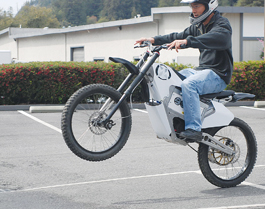home | north bay bohemian index | features | north bay | feature story

Photograph by Will Mosher
X-Factor It may sound melodramatic, but due to noise and emission complaints, motocross is facing a real threat in this state.
Quiet Riot
An aerospace engineer unveils the silent invention he says will save motocross
By Steve Hahn
The light blinks on with the flick of a switch. A subtle hum, almost a purr, is barely distinguishable above the sound of distant traffic.
"Is it on?" asks rocket scientist Neal Saiki. "Oh, yeah, the light is on. You're ready to go."
The off-road motorcycle, made especially for the loud, dirty sport of motocross, jets silently across the pavement of a business park, leaving not even a wisp of smoke in its wake—which makes sense, considering this motorcycle isn't burning anything. It runs completely on electricity and is one of the first motorbikes of its kind to be mass-marketed by an industry professional.
Using the newest in lithium-ion-battery technology and the same aluminum alloy used in Boeing airplanes, it's lighter and quicker than many of its competitors. It's fast, too, capable of accelerating from zero to 60 in four seconds. All that's missing is the stench, smoke and irritating noise of a two-stroke motor.
As if a clean, fast and lightweight off-road motorcycle weren't cool enough, Saiki, who designed mountain bikes for Trek, Santa Cruz Bicycles and a slew of individual mountain biking pros before founding Zero Motorcycles in 2006, is convinced his new Zero-X bike will save the dying sport of motocross in California.
It may sound melodramatic, but motocross is facing a real threat in this state. As housing developments sprout up next to formerly rural motocross tracks in growing cities, dirt bikes risk being fingered as a nuisance. Eventually, the cost of police citations can become so burdensome to track owners that they shut down, leaving enthusiasts to travel long distances to find a track where neighbors won't complain.
"On the Central Coast of California alone, six tracks have been shut down in the last two years," says Saiki. "It's because of the noise. Every county in California has a noise ordinance covering off-road motorcycles. So really, people have no choice but to go to silent motorcycles."
Saiki, a self-described "outdoorsman" who received an aerospace degree from Cal Poly before going to work for NASA early in his career, gazes thoughtfully into the distance as he recalls a particularly gruesome story that convinced him it was time to release the Zero-X.
"Just last year, someone in Los Gatos hated the sound of the off-road vehicles going by their property so much they strung up a rope across the road. A rider came by and it almost ripped his head off! The guy had to get like a hundred stitches across his neck," says Saiki. "So these riders really need this technology right now."
The environmental benefits of an electric motorbike are obvious, but the point Saiki is fixated on is that these vehicles are just as fun as any smog-spewing, gas-powered Kawasaki. Not to mention that it costs less than the equivalent of a penny a gallon to fill up, or around $300 a year to power.
"We're fighting against this notion that electric vehicles are slow and boring," says Saiki. "We want to show that this thing is absolutely incredible. The lack of noise also adds a different element to the racing itself, because you can actually hear what's going on around you and the people creeping up behind. You can hear the trash talking, so it's a lot more fun."
Saiki is hoping the California Department of Parks and Recreation will share his excitement. He sold three units to the department for evaluation on use for rangers—tests are starting up in the Hollister hills—and he hopes it will want more. Montana's Department of Fish and Game also has one out for evaluation, and Zero Motorcycle's marketing drive is just warming up. Within the next few years, Saiki expects to sell thousands of units.
Daphne Green, deputy director of the parks department's off-highway vehicle division, hasn't had a chance to take the Zero-X out for a spin, but says she's excited about innovations in the off-roading industry. Along with the Zero X, her division is also testing out environmentally friendly ATVs, another electric motorcycle and some dune buggy–like creations known as "side-by-sides."
"We're looking within the department to reduce our carbon footprint," she says. "The ultimate goal, as a division, is to look at how we can work with the governor's directive to reduce our greenhouse gas emissions. The fact that this is a local company really helps accomplish that objective as well."
Back in the parking lot, Saiki demonstrates the tricks he's learned on the bike so far. As he pops a wheelie and lets out a yelp of pleasure, it's obvious he's realized a life dream. Saiki brings the bike to a stop, a grin brightening his face.
"I've always wanted to do a motorcycle, but I've also been very involved in the electric-car movement and the broader environmental movement," he says, adding that NASA studies he conducted convinced him electric was the answer. "It was obvious that electric vehicles are the only things that are ecologically sound and will lessen our dependence on foreign oil. The current way motocross is set up, with gas-powered pickup trucks ferrying around gas-powered motorbikes, is ecologically crazy. The Zero-X is a great way to share the environment and have fun."
Send a letter to the editor about this story.
|
|
|
|
|
|